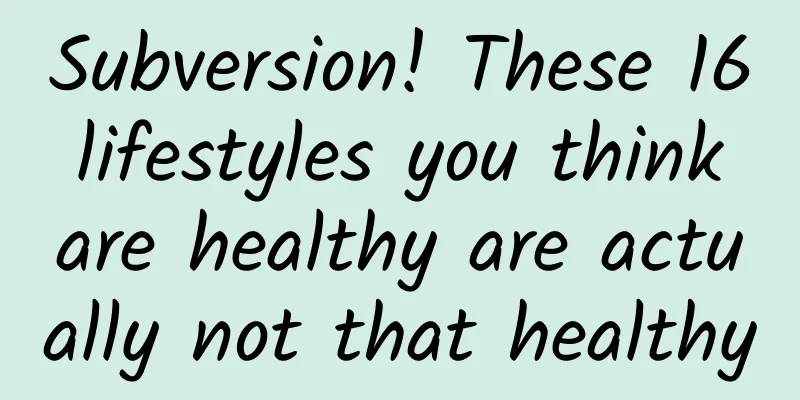Subversion! These 16 lifestyles you think are healthy are actually not that healthy

|
Review of this article: Pa Lizhe, chief physician of nutrition, member of the Science Popularization Committee of the Chinese Nutrition Society Zhao Wei, deputy chief physician of the Department of Neurology and Sleep Medicine Center, Tianjin University Teda Hospital "Drink yogurt after meals to help digestion", "People with high blood lipids cannot eat egg yolks", "Drinking porridge can nourish the stomach"... These are well-known "health tips". Do you feel that your relatives and friends have been emphasizing this all the time? Now let me tell you: these lifestyles that you think are healthy are actually not as healthy as you think, and they have harmed several generations! 【 Healthy Diet 】 1. Drink yogurt after meals to help digestion The truth: It can’t digest food and will increase calories Nutritionist Li Yuanyuan wrote in 2015 that many people think that drinking yogurt or lactic acid bacteria drinks after a meal can help digestion and strengthen the stomach, but in fact, drinking them after a full meal does not help digestion much. Moreover, because yogurt contains protein and other ingredients that also need to be initially digested in the stomach, it will increase the gastrointestinal burden and add extra calories. 2. Drinking grain powder is healthier The truth: Eat whole grains, the less processed the better Wang Yumei, former director of the Nutrition Department of the First Affiliated Hospital of Tsinghua University, pointed out in an interview in 2014 that grinding whole grains into powder or beating them into rice paste will turn whole grains from large particles into small particles, making them easier to digest and absorb, but patients with chronic diseases should pay special attention. For example, for diabetics, excessive consumption of whole grain powder can easily cause blood sugar to rise rapidly. In addition, because food contains trace amounts of fat, after being ground into powder, the contact area with oxygen in the air is greatly increased, making it very easy to oxidize, which not only reduces the nutritional value, but also produces some substances that are harmful to health. It is recommended to eat as many whole grains as possible, the less processed the better. 3. A light diet means eating vegetarian food and less meat! The truth: Eat light flavors For patients with "three highs", doctors will recommend a light diet, but it does not mean being a vegetarian and not eating fish, meat, eggs or milk. Li Quanmin, director of the Endocrinology Department of the Rocket Force Special Medical Center, published an article in 2019: The standard of a light diet is less oil, less salt, and less sugar. "Meat" is a source of high-quality protein, as well as a source of B vitamins and important trace elements. For example, fish, shrimp, and skinless poultry are all high-protein, low-fat meats, which are very suitable for people with "three highs". 4. Drinking porridge can nourish the stomach The truth: Use it or lose it Drink some millet porridge, eat more vegetables and less meat... these are the "secrets to nourish the stomach" passed down by word of mouth. But is this really good for the stomach? Linghu Enqiang, chief physician of the Department of Gastroenterology at the First Medical Center of the General Hospital of the People's Liberation Army, said at an event in 2018 that many widely circulated "stomach-nourishing secrets" are also inappropriate. For example, for patients with gastric ulcers, drinking milk will increase gastric acid secretion due to the high calcium ion concentration, aggravating damage to the gastric mucosa; the fat content in soda crackers is quite amazing, and the sodium content is not low. Excessive intake will increase the burden on the stomach; white porridge and millet porridge are common "prescriptions" for nourishing the stomach, but the stomach function has the characteristic of "use it or lose it". If you eat easily digestible food for a long time, the stomach's digestive ability will degenerate and deteriorate. 5. The longer you cook the soup, the more nutritious and delicious it is. The truth: Cooking soup for too long can cause gout It is often said that drinking soup is good for health, and the soup should be simmered slowly. The thicker it is, the more nutritious it is. Guan Yang from the Department of Nutrition at the Southern Hospital of Southern Medical University said in 2017 that the nutritional value of soup has nothing to do with the cooking time. The soup will taste delicious as long as it is cooked for a while. In addition, studies have found that the longer the soup is cooked, the tastier it tastes, and the higher the nucleotide content. Purine, which causes gout, is the final product of nucleotide metabolism. In other words, the longer the soup is cooked, the higher the risk of inducing gout. Many people think that the most nutritious things in soup are in the soup, which is wrong. The most correct way to drink soup is to drink half a bowl of soup and eat it with a small amount of ingredients. 6. Egg yolks are high in cholesterol and should not be eaten by people with high blood lipids The truth: Eating in moderation does not lead to high cholesterol Chen Binlin, from the Nutrition Department of Guangxi Zhuang Autonomous Region Maternal and Child Health Hospital, published an article in 2019 pointing out that many people throw away the egg yolks after eating eggs, not knowing that many nutrients in eggs are actually present in the egg yolks. Egg yolk contains a variety of trace elements, and is also an excellent source of phospholipids that are beneficial for lowering cholesterol, and can promote the absorption of fat-soluble vitamins. It also contains choline (which helps lower blood lipids and prevent atherosclerosis). Many people are worried that the high cholesterol content in egg yolks may cause hyperlipidemia. Currently, many studies have shown that among adults in my country, moderate egg intake (about 1 egg per day on average) is associated with a reduced risk of ischemic heart disease, major coronary events, and hemorrhagic stroke. 7. Some foods cannot be eaten together! The truth: The theory of food incompatibility does not exist Spinach and tofu cannot be eaten together, otherwise it is easy to cause stones; vitamin C and seafood cannot be eaten together, otherwise it will cause poisoning... "Food incompatibility theory" should be one of the most widely circulated health rumors. Now let me tell you, without theoretical explanation, experimental evidence, and clinical experiment accumulation, this thing does not exist, it is untrue, and it is unreliable! Ge Keyou, honorary president of the Chinese Nutrition Society, said in an interview in 2011 that there is no scientific basis for food incompatibility. Some people do experience physical discomfort after eating so-called "incompatible foods", which is usually caused by seasonal reasons, food poisoning, food spoilage and other factors, and has nothing to do with "food incompatibility". 【Lifestyle 】 1. Drink some wine before bed to help you sleep The truth: It will disrupt the entire sleep state Niu Yajuan, chief physician at Beijing Huilongguan Hospital, said in 2015 that although alcohol seems to be beneficial to sleep on the surface, it may actually interfere with sleep and disrupt the entire sleep state. Alcohol may initially shorten the time it takes to fall asleep, but after the effects of alcohol wear off, frequent awakenings ensue, reducing overall sleep quality. If sleep regularity is disrupted by drinking alcohol before bed, especially for a long time, daytime health and neurocognitive functions such as learning and memory will also be significantly impaired. 2. Drinking milk before bed helps you sleep The truth: Very little effect Wang Zhong, a clinical nutritionist at the Fifth People's Hospital of Chengdu, said in an interview in 2021 that it is theoretically possible, but the sleep-inducing effect is weak. The α-lactalbumin in milk contains 5.3% tryptophan, which can synthesize 5-hydroxytryptophan in the body and further metabolize into melatonin, which participates in sleep regulation. However, the tryptophan content in milk is very low, and the amount that enters the human body and reaches the brain is even lower, so its sleep-inducing effect is weak. 3. Sleeping on a hard bed to protect your waist The truth: A hard bed protects your waist, but it doesn’t mean you sleep on a hardwood board. Wu Shaopeng, director of the Third Department of Orthopedics at Guangdong Second Hospital of Traditional Chinese Medicine, said in an interview in 2016 that sleeping on a bed with a certain hardness can eliminate the pressure of weight and body weight on the intervertebral disc, which is beneficial to relieve the symptoms of low back pain. However, if you sleep directly on a hardwood board, it cannot match the normal curve of the human spine, and the waist cannot be supported, which will cause back pain and other symptoms. A 3-5 cm cushion should be placed on the bed board. 4. You can catch up on sleep on weekends The truth: Staying up late during the week is hard to make up for on weekends Li Yan, chief physician of the Department of Psychological Sleep at Guangdong Provincial Hospital of Traditional Chinese Medicine, said in an interview in 2012 that it is a one-sided idea to expect to make up for sleep on the weekends after working overtime and staying up late. Long-term sleep deprivation will cause physical exhaustion, decreased immunity, and worsening physical fitness. At the same time, if you sleep too long, brain cells will not get enough oxygen and nutrients, which is why you feel very tired after sleeping too much on the weekend. 5. Keep warm in spring and cool in autumn to keep healthy The truth: It depends on the individual and should be done in moderation Yu Li, deputy chief physician of the Department of Internal Medicine at Yanqing Hospital of Peking University Third Hospital, published an article in 2019 stating that keeping warm in spring and cold in autumn is the ancients' summary of health preservation. Although it has the effect of strengthening physical fitness, it varies from person to person and moderation is the key. It is not suitable for the elderly, children, women during menstruation and pregnancy, and people with chronic diseases such as chronic bronchitis, hypertension, cardiovascular and cerebrovascular diseases, arthritis, etc. to be exposed to cold in autumn. They also need to add or remove clothes appropriately according to weather changes to avoid colds. Even if it is suitable for autumn cold, you should protect the important parts of your head, navel, back, shoulders and feet. Therefore, according to your own habits, you should "cover up in spring and freeze in autumn" to strengthen your physical fitness. 【Medical and Health 】 1. Taking vitamin C can prevent colds The truth: It does not prevent or cure colds Gu Chuanling, one of the first registered nutritionists in China, published an article in 2018. The saying that "vitamin C can prevent and treat colds" is widely circulated. However, it is regrettable that taking vitamin C cannot prevent colds. Studies have found that taking vitamin C on a regular basis does not prevent or cure colds, and taking vitamin C after you have a cold basically does not shorten the course of the disease or relieve symptoms. However, increasing your intake of fresh fruits and vegetables rich in vitamin C on a regular basis can indeed enhance your ability to resist disease. 2. Massaging the cervical spine can cure cervical spondylosis The truth: Don’t massage casually Wang Xiaoheng from the Third People's Hospital of Chenzhou City, Hunan Province, pointed out in an article published in 2012 that cervical spondylosis is a common disease among people over 65 years old. Although patients will feel more comfortable in a short period of time with vigorous massage, the symptoms will soon reappear and accelerate the development of cervical spondylosis. After vigorous massage, the muscles swell, and the repeated massage forms a vicious cycle, and the massage intensity increases. Long-term vigorous massage will destroy the stability of the cervical spine, accelerate the degeneration and protrusion of the intervertebral disc, and cause more severe compression of the cervical spinal cord. If the patient's neck discomfort does not ease within 3 to 5 days, he should go to a regular hospital as soon as possible, and do not massage casually. 3. Seasonal infusion can open blood vessels The truth: This method is very harmful Ji Xunming, director of the Beijing Institute of Major Brain Diseases, published an article in 2016 saying that this method is very harmful to people. Not only is it useless, it may even be fatal. Dean Ji Xunming explained: There are many high-risk factors that lead to stroke. Take patients with ischemic stroke and atrial fibrillation as an example. The root cause is atrial fibrillation. If patients do not take precautions and blindly infuse themselves, it is like taking the wrong weapon in a war, which can easily lead to death. Let's talk about "infusion to clear thrombosis". Those Chinese medicine injections that promote blood circulation and remove blood stasis can dredge blood vessels, reduce blood viscosity, and prevent cerebral thrombosis. They seem fresh and reasonable, but in fact they have no scientific basis. So far, there has been no scientific clinical comparison study on regular infusion and no infusion every year after stroke. Infusion may cause heart failure, drug allergic reaction, etc., and induce or aggravate the disease. 4. Children with fever will recover faster if they sweat and sweat out the fever The truth: More likely to cause serious illness Wu Jun, chief physician of the Department of Pediatrics at Peking University Shougang Hospital, pointed out that covering yourself with a quilt to sweat after catching a cold is not suitable for ordinary people, especially for babies. Because the baby's limbs are not adequately supplied with blood and the nervous system is not fully developed, the nerves responsible for vasodilation and contraction are prone to disorder. If the baby is wrapped too tightly, the heat cannot be dissipated, which leads to dehydration, metabolic acidosis, and even more seriously, brain hypoxia. Clinically, there is a disease that is exclusive to children - "covering syndrome", which is a serious disease caused by incorrectly wrapping the baby. When the child is in the fever period, it is especially important to dissipate heat and not cover the baby. Source: Health Times (ID: jksb2013) The pictures in this article with the "Science Popularization China" watermark are all from the copyright gallery. The pictures are not authorized for reprinting. |
<<: The entire universe exists in an ice cream cone?
Recommend
Do “sleep-aiding foods” really help you sleep?
This is the 4373rd article of Da Yi Xiao Hu Sleep...
Practical skills | How to build a sustainable online and offline operation system
Contents of this article: 1. Current situation &a...
55 common terms you must know in the new media industry!
With the booming new media industry, more and mor...
Ma Jianwei Java Core Technology (Part 1 + Part 2 + Part 3)
Ma Jianwei Java Core Technology (Part 1 + Part 2 ...
Korla Mini Program Development Company, how much does it cost to develop a digital mini program?
More and more businesses are paying attention to ...
Samsung vs. Google: Who wins?
The American technology blog TheVerge published a...
Ziyang Mini Program Production Company, how much does it cost to produce a nail art mini program?
There are two types of production of Ziyang Nail ...
Netizens reported that there are bugs in the Continuity function in iOS 16.4 and macOS 13.3, and universal controls cannot be used
On April 6, according to feedback from many netiz...
Plug-in hybrid or extended range? Stop arguing! Volkswagen CEO has given the answer: plug-in hybrid models will be launched
Li Xiang, founder of Ideal Auto, recently pointed...
A brief talk about APP operation: a few things you must know
No matter it is App operation or promotion, the w...
7 key points to explain the strategy of recalling lost users
This article introduces the value of recalling lo...
Tom Cruise Movie Collection (1981-2017) 30 HD English subtitles Tom Cruise Movie Collection Classics
Tom Cruise Movie Collection (1981-2017) 30 HD Eng...
Taking League of Legends as an example: How does Tencent Games operate?
Tencent Games is one of Tencent's four major ...









